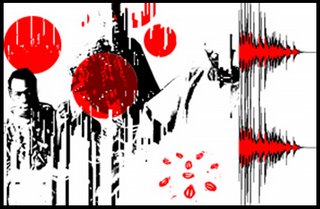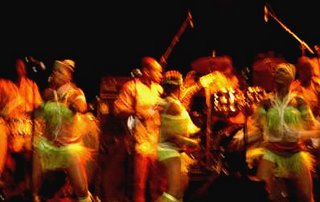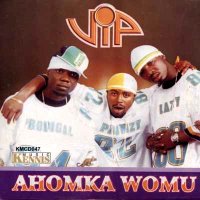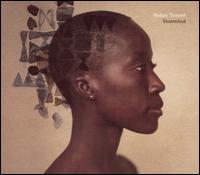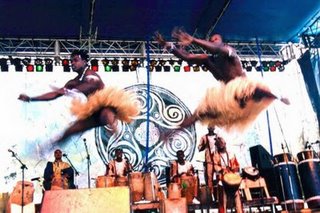
By
David McDavitt
Bethesda, Maryland’s prestigious Strathmore Music Center hosted a performance by one of Ghana’s fiercest dance-drum ensembles, Kusun on June 14th, 2006. A thrilled, standing-room-only audience remained transfixed on Kusun’s spectacle: dancing, clapping, singing along, and mobbing Kusun’s merchandise table until the end of the two hour onslaught. Kusun’s resolve to revive traditional Ghanaian drum music in an era when bubblegum pop & hiphop dominate the market (in the US and Ghana) is noble, and has resulted in a musical experience of the highest order & importance.
Kusun (aptly translates, “living culture”) is a talented ensemble of musicians and dancers from the Ga people of southern Ghana (the indigenous people of Accra & Tema). Founded by Nii Tettey Tetteh in 1997, Kusun includes past members of Ghana’s prestigious “National Ballet” and “The Pan African Orchestra” (seek their monster CD, “Opus 1”). Tetteh also hosts a
drum school in Ghana which is visited annually by international students. Originally based in Ghana, with administrative offices in Australia, Kusun currently resides in Floyd, Virginia- the result of a 2001 invitation to perform at the Floydfest international music festival by Kusun Drum School student, Kris Hodges.
Kusun (like the Ga in general) are great scholars of music, learning & performing the drumming of the nearby Ewe, Akan, and Dagomba along side their own Ga traditional forms. In this sense Kusun’s music may be favorably compared with the pan-Ghanaian drumming of Mustapha Tettey Addy’s “Obonu” group. But Kusun’s music takes a step in a new direction, the addition of Highlife guitar, and bass covered by the expressive Gome drum. Nii Tettey Tetteh calls this amalgam, "Nokoko" (something something). It is a pleasing mix indeed, adding a melodic element with touches of the Western jazz, Cuban son, and Ghanaian palm wine music inherent to Highlife.
On stage, Kusun incorporates Ga Twinchin (like congas) & Gome drums (huge square bass drum sat upon like a cajon: the pitch is varied with your heel); with Ewe Sogo (closed-bottom stick conga), Gankogui (double bell), Totodzi (small dead-sounding support drum), Atsimevu (4 ft tall small headed lead drum); Dagomba Donno (variable tension talking drum) & Brekete (slung bass tom with snare); Ashanti Atumpan (large paired goblet-shaped stick drums), Fontonfrom (4 ft tall tree trunk drums) & atenteben (bamboo flute), and Mande djembe (of Mali).
Although many of Kusun’s compositions are based in traditional forms, they often juxtapose diverse elements, for example having an Akan intro/outro for an Ewe Gahu song. Kusun’s sound incorporates the Ga people's popular "Kpanlogo" (modern highlife-drum social dance) & "Fume-Fume" (social drum-dance), but also includes the Akan people's "Adowa" (antelope/funeral dance)/"Sikyi" (Social Dance), the Dagaaba's "Bawa" (harvest/naming dance), and Ewe tribe's "Agbekor" (war dance)/"Gahu" (anti colonial satire)/"Agbadza" (secular drum dance). Kusun is simultaneously VERY dance-drum, and VERY highlife. There’s much to connect with and enjoy. The music is powerful, complex, approachable, and joyous. Rarely have I seen an audience so completely mesmerized.
Kusun are polished consummate performers. The arrangements are air-tight, the band relaxed and all smiles. Tetteh banters & jokes with the audience with friendly confidence, informing and entertaining. The dancers are great show-stealers, with inhuman strength, the grace of large predatory African cats, new elaborate costumes for each dance/culture, and huge amounts of audience engagement. They tell stories without words. Their acrobatics thrill & amaze- and they make it look effortless, but don’t try this at home!
Kusun has
two CD’s and four
instructional videos available.
Check out the calendar on Kusun’s
website and experience this powerful group for yourself!
DRUMS/VOCALS:
Nii Tettey Tetteh
Samuel "Otu" Kodjo
Emmanuel A. Anang
Nelson Glover Yao
Addotei Bruice
Enest Borketey
Odai Moses
GUITAR/PERCUSSION:
Robert "Obuobi" Ashong
DANCERS:
Francis "Adjetey" Ostiwuo Adjei
Osendah
Naa Koshe Mills
Rita Taiwiah
Martha Ayikwei
 When I first came to Washington, DC from Miami, the sounds blasting out of cars made me do a double-take every time. The Doppler effect made the music sound like like Konono No. 1, but harder. And slower ... and ... American ... but, from down the street, I swear it sounded like a futuristic African dance party. I heard it here first: Go Go.
When I first came to Washington, DC from Miami, the sounds blasting out of cars made me do a double-take every time. The Doppler effect made the music sound like like Konono No. 1, but harder. And slower ... and ... American ... but, from down the street, I swear it sounded like a futuristic African dance party. I heard it here first: Go Go.